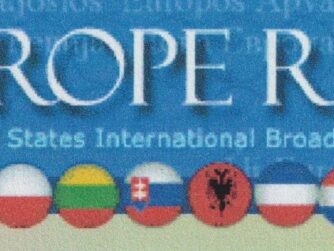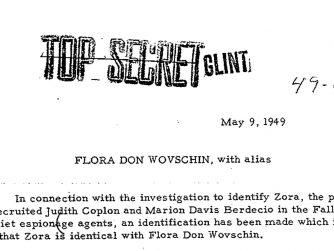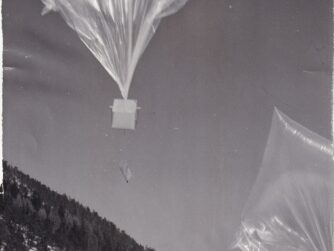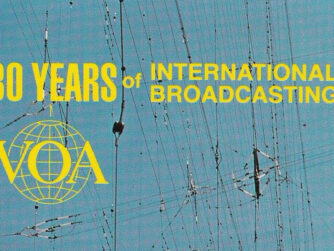Owen Lattimore on “Greenhouse Vitamins for Miners” in the Soviet Gulag
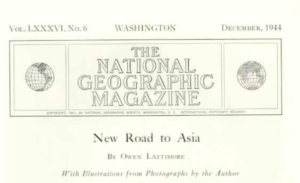
Owen Lattimore’s article, which appeared in the December 1944 issue of the National Geographic Magazine, may offer a hint of what kind of pro-Soviet and pro-communist Voice of America broadcasts to China and other countries in Asia were produced when he held key executive positions at the U.S. Office of War Information. Lattimore published the article after accompanying U.S. Vice-President Henry A. Wallace on his trip to Siberia, China, and Mongolia in 1944 for OWI. The Soviet handlers took the American delegation to the Gulag gold mines, where, before and after their visit, Stalin’s prisoners were kept under the harshest conditions, and thousands were worked to death. For the sake of the visiting Americans, the Soviet authorities transformed the work camps shown to the delegation into Potemkin villages. Well-fed and well-dressed NKVD guards, which appear in a photograph taken by Lattimore and used by National Geographic to illustrate his article, were substituted for slave laborers. The Gulag camps’ shops were filled with food and goods never before seen at the sites. Lattimore was either deliberately lying or wholly convinced this was a typical Soviet enterprise. He wrote for American readers in his National Geographic article about the concern shown by the communist authorities for the health of the workers:
Greenhouse Vitamins for Miners
We visited gold mines operated by Dalstroi in the valley of the Kolyma river… . It was interesting to find instead of sin, gin, and brawling of an old-time gold rush, extensive greenhouses growing tomatoes, cucumbers, and even melons, to make sure that the hardy miners got enough vitamins!1
The Voice of America, under the direction of OWI officials and journalists such as Owen Lattimore, Joseph Barnes, Wallace Carroll, John Houseman, and Elmer Davis, was deceiving not only foreign audiences. Some also misled millions of Americans at home about Soviet Russia and the Communists in China. Even though members of Congress, who were alarmed about the executive branch using government funds to propagandize to Americans, eliminated in 1943, in a bipartisan vote, almost all of OWI’s domestic propaganda budget, some of these fellow traveler-journalists were still promoting in the United States their highly deceptive views of Stalin and communism thanks to having easy access to U.S. radio networks, newspapers, and magazines.
Owen Lattimore compared the Dalstroi (also written as Dalstroy – Far North Construction Trust) “to a combination of Hudson’s Bay Company and TVA.” 2 He wrote that the workers he saw had volunteered for war but were ordered to stay because of Russia’s need for gold.3 He described in glowing terms the head of Dalstroi, Mr. Nikishov, as a recent recipient of the Order of Hero of the Soviet Union. He added that Mr. Nikishov and his wife “have a trained and sensitive interest in art and a deep sense of civic responsibility.”4 Near the Gulag camps, where thousands of prisoners died, the American delegation was entertained by “a fine ballet group from Poltava, in the Ukraine (sic).” Lattimore quoted one member of President Wallace’s delegation as saying, “high-grade entertainment just naturally seems to go with gold, and so does high-powered executive ability.”5 Ivan Fedorovich Nikishov was a Soviet NKVD Lieutenant General.
For those Americans who were not well-informed about Soviet Russia, such articles by an Office of War Information and Voice of America U.S. government executive made it easier to accept or tolerate President Roosevelt’s decisions to make political and territorial concessions to Stalin at the expense of the people in Eastern Europe and help establish pro-Soviet governments in the region to rule over them for many decades. Alexander Barmine told the McCarran subcommittee that while working as an advisor for Reader’s Digest, he had convinced the editors not to publish another article by Owen Lattimore, which he described as presenting the straight communist and Soviet line “camouflaged,” as he pointed out, “in very devious ways.”
Henry Wallace withdrew his support for the Soviet Union during the Korean War. In an article written in 1952, Wallace called the Soviet Union a country “utterly evil,” a term similar to the “evil empire” that President Reagan used against Soviet Russia many years later.6 Owen Lattimore and Joseph Barnes remained unapologetic.
When General Berzin described them to Barmine as “our men” who could be of help to him in his intelligence work in China, he might have meant that they could provide a journalistic cover to hide the real nature of Barmine’s GRU mission, just as Latimore’s article in the 1944 issue of National Geographic obscured slave labor in the Gulag camps, Barnes’ reporting from the Soviet Union in the 1930s minimized the Red terror, and Howard Fast’s censorship at the Voice of America helped to protect Joseph Stalin from being seen as a brutal dictator. One of Barnes’ 1938 reports from Russia for the New York Herald-Tribune, selling the Soviet experiment of governing to Americans, was written in the style of a Hollywood gossip column, with no mention of the human tragedy of Stalinist repressions:
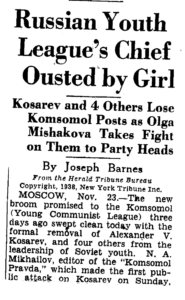
Under the headline, “Russian Youth League’s Chief Ousted by Girl,” Barnes reported on November 24, 1938, for the next day edition of the New York Herald-Tribune that “The new broom promised to the Komsomol (Young Communist League) three days ago swept clean today with the formal removal of Alexander V. Kosarev, and four others from the leadership of Soviet youth.”7 Kosarev, the head of Komsomol, participated in Stalin’s Great Purge before he himself was arrested and later executed. His wife and their daughter were arrested and exiled. It was the story of millions of families under Stalin’s rule in the Soviet Union — hidden or unnoticed by Barnes and Lattimore, and definitely banned in the early Voice of America broadcasts. The note about Joseph Barnes in the 1943 Sumner Welles’ memorandum to the Roosevelt White House seemed accurate in stating that he gave the Soviet Party line “a form congenial to the American way of expression.” Barmine’s concerns about their propaganda supporting Soviet interests seemed well-founded, even if they never formally joined the Communist Party or became agents of Soviet military intelligence. Barmine was first to admit that he did not know whether they were communist party members and what exactly was the nature of their work for GRU, which his superior told him they did. He was, however, absolutely sure that their propaganda activities were putting the United States and Americans in grave danger.
Barnes’ and Houseman’s protegé, Howard Fast, who later admitted that he formally joined the Communist Party in 1943 while still working for the Voice of America, in his role as the first VOA chief news writer and editor, simply censored all information about Stalin’s atrocities by rejecting it as “anti-Soviet propaganda.” He wrote in his memoir, Being Red:
As for myself, during all my tenure there [VOA] I refused to go into anti-Soviet or anti-Communist propaganda.8
Alexander Barmine saw Owen Lattimore as also helping to deceive Americans and the rest of the world about the Soviet regime, as he testified before the McCarran subcommittee in 1951:
Mr. BARMINE. You see, when I first came to this country I did not know the English language at all. I couldn’t say a word. So I started to learn English in 1940. So I had a very little idea of what was going on in America’s political life. Then I was studying it very intensively and I began to read the newspapers. That was my manual for my English.
Then I was approached by several magazines for whom I worked giving advice and editorial assistance on some stories. Many times I was approached by Life or Time magazine. I published several articles and then I began to work with the Reader’s Digest.
From the Army I was transferred to OSS and I remained in OSS, in the Office of Strategic Services, until the fall of 1944. At the same time I began to work as editorial adviser to Reader’s Digest. In 1944 I wrote an article in the Reader’s Digest about Communist infiltration in the Government apparatus in the United States.
When I was writing this article I had in mind the background of all the things I told you, but I was not considering it possible or proper to bring it out publicly. What I wanted, I wanted to warn the Government about infiltration, about the way, about the plans, and about the scope of the danger. I was discharged from the Office of Strategic Services after that.
Senator FERGUSON. After you published the Reader’s Digest article?
Mr. BARMINE. That is right, in 1944. Then I remained with Reader's Digest in an editorial capacity, but this time I learned about the Chinese problem in relation with the American foreign policy, and I would say I was very much worried about the course that this development took and about the propaganda that was spread at this time on China.
Now I was asked by Reader's Digest to pass on manuscripts, articles which were connected with Soviet policy and communism. And I was asked to give my opinion about the condensation of the Lattimore book. Solution in Asia, in 19— I couldn't say exactly, but it was probably in the spring of 1945.
Mr. MORRIS. April 7,1945?
Mr. BARMINE. In the spring of 1945.
Well, my opinion was asked about this book and I wrote a memorandum for Reader's Digest because I considered this book a very clever camouflage Communist propaganda.
Mr. MORRIS. You had in mind your previous conversations with General Berzin and General Krivitsky?
Mr. BARMINE. I had it in mind but I did not consider that was necessarily relevant to the point, because many years passed, I would consider this book on its merits and the position of the author. I considered this book tremendously harmful and deceiving. This was my opinion expressed to the editor of Reader's Digest.
The CHAIRMAN. Who was the author of that book?
Mr. BARMINE. Owen Lattimore. My recommendation was that if this condensation of the book would be published in many millions of copies in Reader's Digest would bring very serious harm to the interest of the United States.
A lot of pressure was put on the Director of the Reader's Digest to publish the condensation. Practically when I was writing this memo I was called every day and told the editor in chief demanded the memo because a decision must be made, they considered it very important. So I wouldn’t be sure that the memo was decisive, but as a result of the memo the decision was taken by Reader's Digest against publishing the condensation.
I reworked this memo in the form of a review of the book. I gave this review and it was printed in the New Leader.
Mr. MORRIS. At this point, Mr. Chairman, I would like to offer into evidence a copy of the book review of Solution in Asia by Owen Latimore, reviewed by Alexander Barmine, which appeared in New Leader on April 7, 1945. I would like to introduce that in the record at this time.
The CHAIRMAN. This is a public issue that was put out?
Mr. MORRIS. A book review by Mr. Barmine of Lattimore’s book Solution in Asia.
The CHAIRMAN. It may be received in the record.9
In his review of Lattimore’s book, Barmine wrote that he “presents a picture of Soviet Russia which corresponds accurately with his picture of communist China.” Barmine quoted from Lattimore’s book that in the eyes of the people in Asia, “the Soviet Union stands for strategic security, economic prosperity, technological progress, miraculous medicine, free education, equality of opportunity, and democracy: a powerful combination.” Lattimore then adds his own opinion: “The fact that the Soviet Union also stands for democracy is not to be overlooked. It stands for democracy because it stands for all the other things.”10
The CHAIRMAN. That is an excerpt from your book?
Mr. BARMINE. This is a review of the book Solution in Asia. The basis of this review was my memorandum to Reader's Digest.
Mr. MORRIS. This is the second one you wrote? Once you wrote a memorandum to Reader's Digest pointing out the harm you thought was inherent in the book and in addition you wrote a book review for the New Leader?
Senator O'CONOR. The witness has described it as clever Communist propaganda, if I understood your description?
Mr. BARMINE. That was my impression.
Senator O’CONOR. Could you briefly elaborate on that and give us the benefit of your views as to why you described it thusly?
Mr. BARMINE. I don’t think I could say it better than I put it.
Senator O'CONOR. You do give it in pretty lengthy fashion.
Mr. BARMINE. If you want a general appraisal, that would be the book which, if it could convince the people, would sell them unknowingly the Communist line in China which would be in the interest of the Soviet Union and disaster to the United States.
Senator O’CONOR. It did follow the Communist line?
Mr. BARMINE. In a very slick and smooth manner, in very devious ways. It never would be the direct statement of the author; it would be always related to people who think, people who say the other, but in fact it was telling the straight Communist line, camouflaged, I would say, very skilled.11
Barmine’s testimony before the McCarran was undoubtedly a great shock for Lattimore and Barnes. Still, Barmine responded to questions in a dignified manner and made no direct accusations against the two Americans but instead repeated what he said he had heard about Lattimore and Barnes from General Berzin. Barmine had already given the same information confidentially to the Federal Bureau of Investigation on December 14, 1948.12 In 1950, Barmine rebuffed attempts by Senator McCarthy’s staff to sign an affidavit about what he had told the FBI and was not at all eager to make them public.13 Like most witnesses, he was subpoenaed to appear before McCarran’s and McCarthy’s subcommittees and testified under oath.
After Barmine’s 1951 testimony before the McCarran subcommittee, Lattimore and Barnes accused him of engaging in typical communist rhetoric. However, his testimony seemed considerably more matter-of-fact and restrained than their criticism.
NOTES:
- Owen Lattimore, “New Road to Asia,” National Geographic, December 1944, p. 567.
- Ibid.
- Ibid., p. 642.
- Ibid., p. 657.
- Ibid.
- Henry A. Wallace “Where I Was Wrong”, The Week Magazine, September 7, 1952, https://delong.typepad.com/sdj/2013/02/henry-a-wallace-1952-on-the-ruthless-nature-of-communism-cold-war-era-god-that-failed-weblogging.html.
- Joseph Barnes, “Russian Youth League’s Chief Ousted by Girl,” The New York Herald-Tribune, November 24, 1938, https://www.cia.gov/readingroom/docs/CIA-RDP90-01226R000100040013-5.pdf.
- Howard Fast, Being Red (Boston: Houghton Mifflin Company, 1990), p. 23.
- Institute of Pacific Relations.: Hearings before the United States Senate Committee on the Judiciary, pp. 212-213, https://hdl.handle.net/2027/umn.31951d02120505q?urlappend=%3Bseq=223%3Bownerid=13510798903345995-227.
- Ibid. p. 216, https://hdl.handle.net/2027/umn.31951d02120505q?urlappend=%3Bseq=226%3Bownerid=13510798903345995-230.
- Ibid., p. 215, https://hdl.handle.net/2027/umn.31951d02120505q?urlappend=%3Bseq=225%3Bownerid=13510798903345995-229.
- The Federal Bureau of Investigation, FBI Records: The Vault, “Owen Lattimore, Part 1 of 2,” https://vault.fbi.gov/Owen%20Lattimore/Owen%20Lattimore%20Part%201%20of%202/view.
- The Federal Bureau of Investigation, FBI Records: The Vault, “Owen Lattimore, Part 2 of 2,” https://vault.fbi.gov/Owen%20Lattimore/Owen%20Lattimore%20Part%202%20of%202/view.



